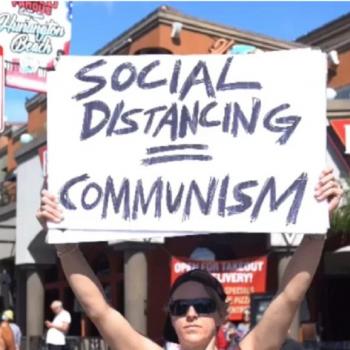It’s Labor Day! You know, that holiday we’ve all forgotten has the word “labor” in it! Labor, as in the labor movement. Who knew! Labor Day is just a fun three day weekend at the end of the summer, am I right? Mind you, I’m not complaining. I love me a three-day weekend! But just what is the history of Labor Day?
You probably know that the Industrial Revolution brought along with it low wages, 16-hour work days, six or even seven-day work weeks, and terrible working conditions. People resisted by forming unions and demanding higher wages and shorter working days—in other words, it was the birth of the labor movement. Making headway was extremely difficult. When people went on strike, companies sought to suppress these strikes, often violently. And then there was the government to contend with.
According to History.com, Labor Day was initially born in 1882:
On September 5, 1882, 10,000 workers took unpaid time off to march from City Hall to Union Square in New York City, holding the first Labor Day parade in U.S. history.
The idea of a “workingmen’s holiday,” celebrated on the first Monday in September, caught on in other industrial centers across the country, and many states passed legislation recognizing it.
This 1882 workers’ parade in New York was the origins of the idea of Labor Day, but that idea didn’t become a federally recognized holiday until twelve years later, in 1894. See, something happened in 1894. (Bad things. Bad things happened.)
On May 11, 1894, employees of the Pullman Palace Car Company in Chicago went on strike to protest wage cuts and the firing of union representatives.
On June 26, the American Railroad Union, led by Eugene V. Debs, called for a boycott of all Pullman railway cars, crippling railroad traffic nationwide. To break the Pullman strike, the federal government dispatched troops to Chicago, unleashing a wave of riots that resulted in the deaths of more than a dozen workers.
In the wake of this massive unrest and in an attempt to repair ties with American workers, Congress passed an act making Labor Day a legal holiday in the District of Columbia and the territories. On June 28, 1894, President Grover Cleveland signed it into law.
Yes, you did read that correctly—Labor Day was the federal government’s way of saying sorry for intervening in the Pullman strike by sending federal troops to Chicago and killing several dozen strikers.
The Encyclopedia Britannica puts it like this:
The federal government’s response to[the Pullman strike] marked the first time that an injunction was used to break a strike. Amid the crisis, on June 28, President Grover Cleveland and Congress created a national holiday, Labor Day, as a conciliatory gesture toward the American labour movement.
A conciliatory gesture. What a nice way to put it.
We should talk about the Pullman strike, shouldn’t we? It began after the company laid off workers and cut wages by 25%. Workers were required to live in a company town created by Pullman. The company controlled these workers’ rent and utilities, grocery costs and everything else—and none of these costs were lowered. When the workers sent a delegation to request that these costs be lowered, they were rebuffed.
Worried that their families would starve, Pullman workers went on strike. The American Railway Union supported the strike, and railway workers across the country soon refused to handle Pullman cars, snarling rail traffic across the country. The strike went on for over a month, and the company did nothing. In early July, Grover Cleveland decided to intervene, citing a constitutional obligation to keep the mail moving. (Yes, really.) But rather than demand that the company come to the table and make concessions, or send in mediators to hammer out a plan between the two sides, the president came down fully on the company’s side.
Cue a federal injunction, federal interference with union leaders’ communications, the dispatch of federal troops, and shooting, followed by continued efforts by the company to put down the strike, and the arrest of major strike leaders, including Eugene V. Debs, who was charged with conspiracy to disrupt the mail. The strike collapsed, and nothing changed at all at the Pullman Company. Oh—and the entire leadership of the American Railway Union was jailed, leading to the union’s complete dissolution.
But hey! We got a federal holiday as an apology note! So that’s cool!
I have a Patreon! Please support my writing!















